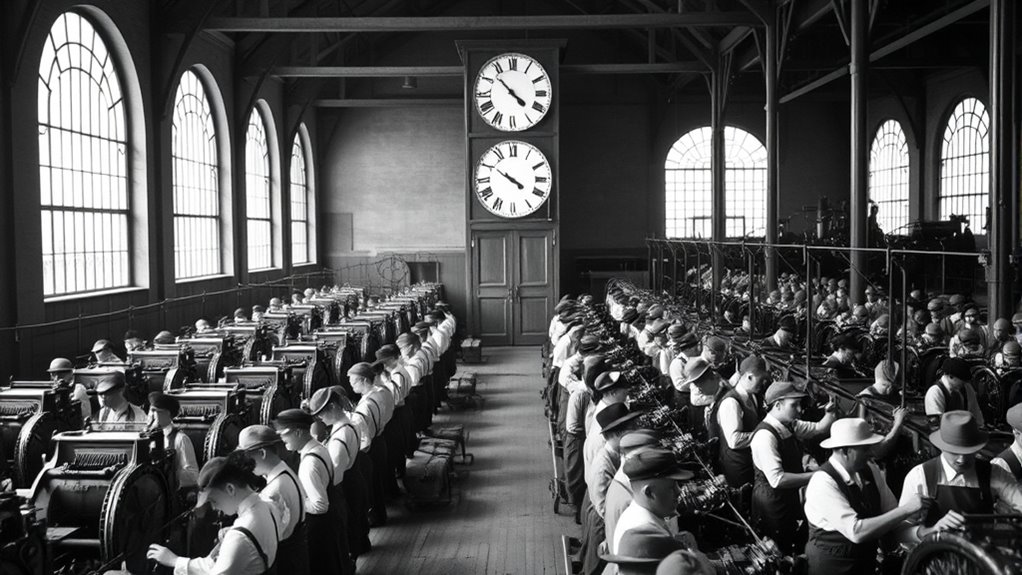The cultural history of the workweek shows how societal shifts transformed our attitudes towards work and leisure. It started with labor movements pushing for shorter hours, leading to the standard five-day schedule during industrialization. Monday represents both an end to rest and a fresh start, symbolizing renewal and discipline. As work models evolve toward flexibility, understanding Monday’s significance helps you see how cultural values shape your experience of the workweek—discover more about this fascinating history.
Key Takeaways
- The 40-hour workweek was established through labor movements and legislation during the early 20th century, reflecting societal shifts toward standardization.
- Monday symbolizes a cultural reset, representing renewal, productivity, and societal attitudes toward work and leisure.
- Industrial Revolution mechanization historically extended work hours, influencing the cultural importance of Monday as a symbol of both end and new beginning.
- Modern trends favor flexible work schedules and remote work, reshaping perceptions of Monday and work-life balance.
- Societal values around work ethics and discipline continue to shape attitudes toward the workweek and the significance of Monday.
Origins of the Five-Day Workweek

The origins of the five-day workweek trace back to early labor movements and legislative reforms aimed at improving workers’ lives. During the late 19th and early 20th centuries, labor movements demanded better working conditions, including shorter hours. These movements pushed for legislative reforms that limited daily and weekly work hours, seeking to reduce exploitation and promote a healthier work-life balance. As workers organized strikes and protests, lawmakers responded by enacting policies to regulate working hours. The push for a standardized five-day workweek gained momentum, especially in industries where long hours were common. These efforts laid the foundation for modern work schedules, reflecting a shift toward recognizing workers’ rights and prioritizing their well-being. Additionally, the adoption of the five-day workweek was influenced by the increasing emphasis on employee satisfaction and productivity in the workplace. The concept of a shorter workweek also aligns with labor rights, which continue to influence workplace policies today. Moreover, the role of legislative reforms was crucial in formalizing the transition to the five-day model, ensuring widespread adoption across various sectors.
The Industrial Revolution’s Impact on Work Patterns

As industries mechanized and factories expanded during the Industrial Revolution, work patterns transformed dramatically. You’d now spend long hours in factories, often six days a week, with strict schedules dictated by machinery. Technological innovations, like the steam engine and mechanized looms, increased production but also intensified labor. Workers faced grueling conditions, prompting labor movements to demand better treatment, shorter hours, and fair wages. These movements gained momentum throughout the 19th century, challenging the old agrarian routines and pushing for reforms. The shift from agrarian work to factory labor reshaped perceptions of time and productivity. As a result, the concept of a structured workweek emerged, laying the groundwork for the modern Monday-through-Friday routine that still influences work culture today. Additionally, the development of mass production techniques contributed to standardizing work hours and schedules across industries, marking a significant shift in industrial labor practices.
Cultural Significance of Monday in Modern Society

Have you ever wondered why Monday often feels like a fresh start or a fresh challenge? It’s because Monday carries deep weekend symbolism, representing both endings and new beginnings. You might experience these Monday rituals:
- Reorganizing your space to start fresh.
- Setting goals for the week ahead.
- Reflecting on weekend experiences and lessons learned.
- Attaching hope or dread to the week’s prospects.
This ritualistic approach helps you shift from weekend relaxation to workweek focus. Monday’s cultural significance is rooted in its role as a reset button, inspiring motivation or anxiety. It’s a day that symbolizes both opportunity and obligation, shaping how society perceives the start of each new week. Additionally, the significance of Monday can be linked to the concept of renewal, which underpins many cultural practices related to new beginnings. Recognizing the historical importance of Monday across different cultures emphasizes its role as a universal marker of transition and renewal process, which is also explored in sound healing science, which explores how specific frequencies can promote healing and mental clarity, could further enhance this sense of renewal.
Shifts Toward Flexible and Remote Work Models

Recent years have accelerated the shift toward flexible and remote work models, transforming traditional office routines into more adaptable arrangements. Telecommuting trends show that more people now work from home or alternative locations, improving work-life balance. This evolution also reflects a broader cultural shift toward valuing work-life balance, which is increasingly prioritized by employees and employers alike. This shift allows you to customize your schedule, reduce commuting time, and better manage personal responsibilities. Many organizations embrace these changes, recognizing the benefits for productivity and employee well-being. To highlight these trends, consider the following:
| Work Flexibility | Benefits | Challenges |
|---|---|---|
| Telecommuting | Better work-life balance | Isolation |
| Flexible hours | Increased productivity | Distractions |
| Remote teams | Cost savings | Communication barriers |
| Hybrid models | Employee satisfaction | Technology reliance |
This evolution reshapes how you perceive the workweek, emphasizing adaptability and personal well-being. Additionally, implementing organized workspace strategies at home can further enhance productivity and reduce clutter, supporting the new flexible work environment. As AI continues to evolve, it plays an increasingly significant role in supporting remote collaboration tools and managing flexible work arrangements, making these models more efficient and accessible for everyone. Embracing technology integration can help overcome some of the challenges associated with remote work, such as communication barriers and distractions.
The Future of the Workweek and Cultural Implications

The rise of flexible and remote work models is reshaping the traditional concept of the workweek, prompting questions about what the future holds. You may find yourself experiencing:
- Greater work-life balance, allowing more time for personal passions and family.
- Increased societal productivity, as people work when they’re most effective.
- Reduced stress from commuting and rigid schedules.
- A cultural shift in how we define success, valuing well-being over hours logged.
Furthermore, these evolving work patterns highlight the importance of organic and natural juices in supporting health and wellness amid changing lifestyles. Incorporating holistic health practices can further promote overall well-being in this new work environment. These changes could lead to a more humane and balanced approach to work, where personal fulfillment and societal progress go hand in hand. Recognizing the cultural significance of the workweek can help us understand how these shifts influence our collective values. The future of the workweek isn’t just about efficiency; it’s about redefining our cultural values around work and life.
Frequently Asked Questions
How Did Ancient Civilizations Organize Their Work Schedules?
You might find that ancient civilizations organized work around labor rituals and agricultural cycles. They synchronized their schedules with seasons, planting and harvesting at specific times. Religious or communal ceremonies often dictated work patterns, creating a rhythm that aligned with nature’s changes. This way, their work schedules reflected a deep connection to the land and spiritual practices, shaping their daily routines and community life.
Were There Societies With Different Workweek Structures Historically?
Have you ever wondered if societies ever broke free from the five-day workweek? Throughout history, various cultures had unique work patterns and cultural work rituals. Some groups, like ancient Egyptians and certain Indigenous communities, followed seasonal or task-based schedules rather than a fixed week. These differences highlight how historical work patterns weren’t universal but shaped by cultural values, environment, and societal needs, creating diverse approaches to work across time and space.
How Do Religious Practices Influence the Perception of Monday?
You see, religious practices shape how you view Monday by designating sacred days and rituals. Many faiths consider certain days, like Sunday or Friday, sacred, making Monday feel less special or even a fresh start after worship. Religious rituals influence your perception, often marking the beginning or end of spiritual observances, which affects whether you see Monday as a workday or a day for reflection and renewal.
What Role Does the Workweek Play in National Identity and Pride?
Imagine the workweek as a flag waving proudly in the breeze—symbolizing unity and shared purpose. It shapes your national pride and cultural identity, reflecting a society’s values and work ethic. By embracing the structure of the workweek, you contribute to a collective identity rooted in dedication and progress. Monday, as the start, energizes this symbolism, reinforcing your connection to the nation’s identity and fostering pride in your shared accomplishments.
How Might Future Technology Reshape Traditional Workweek Concepts?
Future technology, like automation evolution and virtual workspace tools, could drastically reshape your workweek. You might work fewer hours, thanks to smarter systems handling routine tasks, and enjoy more flexibility with remote work. These innovations could break traditional Monday-to-Friday routines, giving you control over your schedule. As technology advances, your workweek could become more personalized, efficient, and adaptable to your lifestyle, transforming how you connect with work and leisure.
Conclusion
As you embrace the evolving rhythm of the workweek, remember that each Monday offers a fresh canvas, a gentle dawn inviting new beginnings. Though traditions shift like the tides, the essence of work remains a steady beacon guiding your journey. By steering through these changes with an open heart, you’ll find that the future of work is like a sunrise—bright, promising, and full of opportunity waiting just beyond the horizon.









